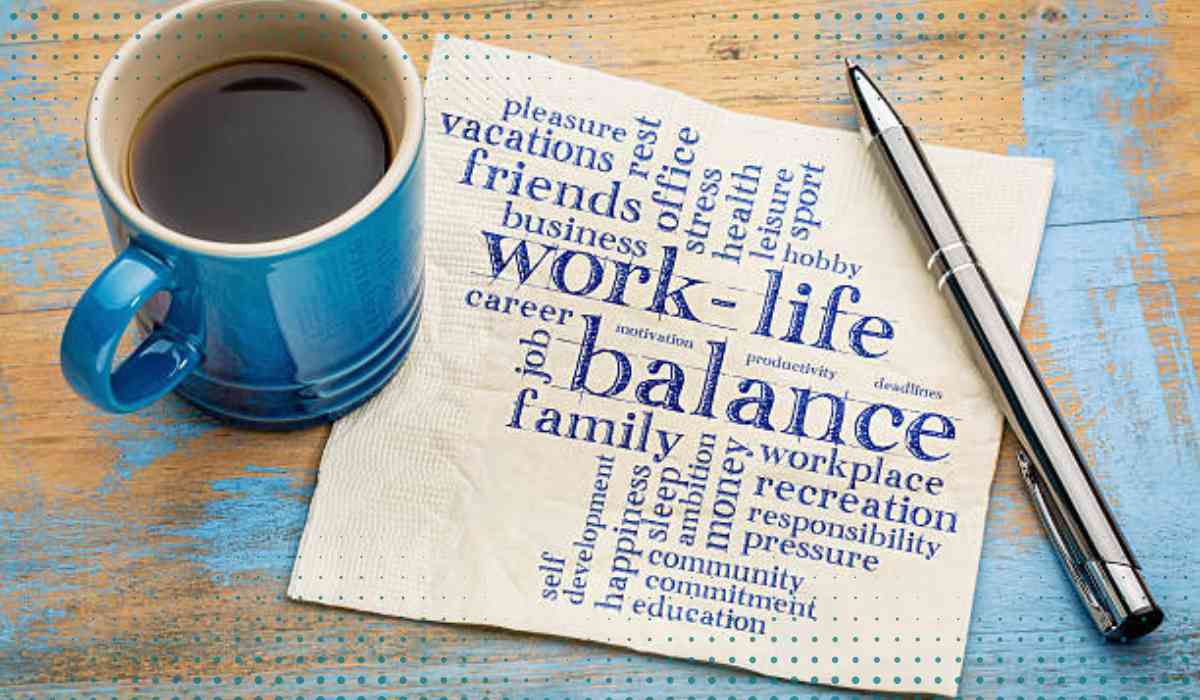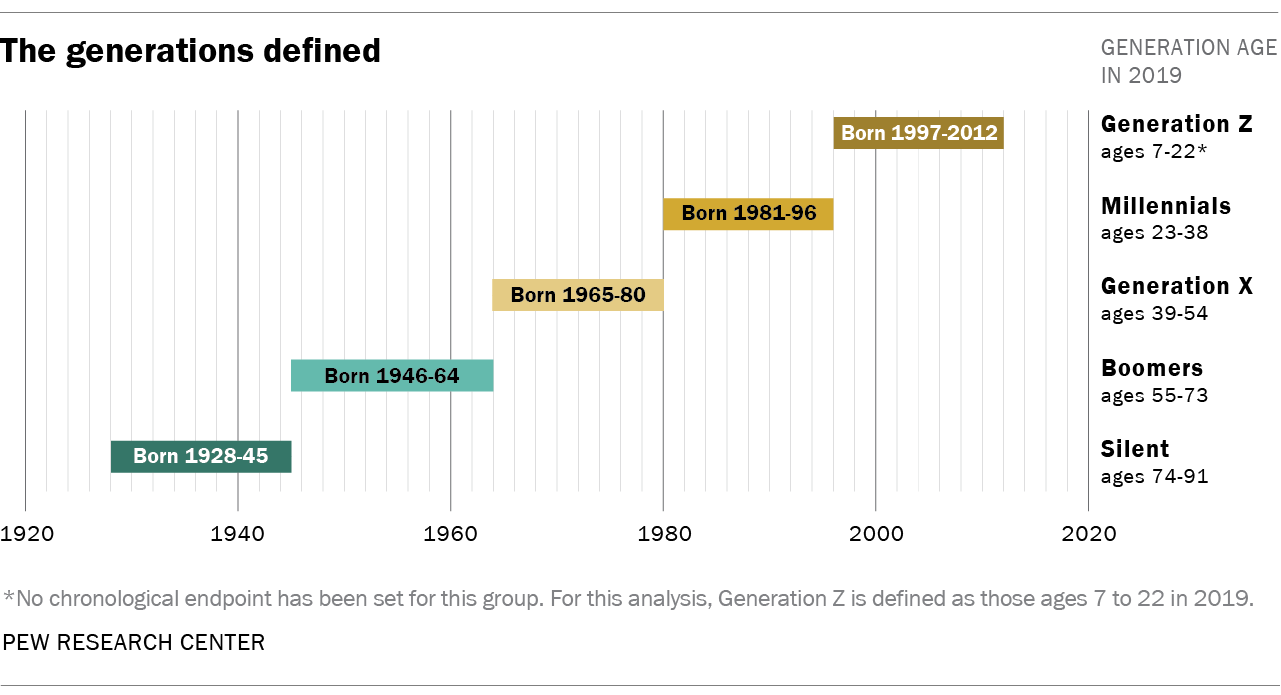The youngest generation in the workforce—Gen Z—is driving a profound shift in how we think about work and life. More than ever before, this generation is prioritising balance over the traditional hustle, signalling a significant departure from the relentless work ethic that has long defined career success in previous generations.
A recent survey reveals that 47% of Gen Z actively seek work-life balance when considering job opportunities. This emerging mindset reflects a growing desire to not only succeed professionally but also to thrive personally. But what’s driving this change? Is it simply a generational trend, or is Gen Z onto something? To fully grasp the nuances of this shift, we need to explore the historical differences that have shaped the workplace priorities of previous generations.
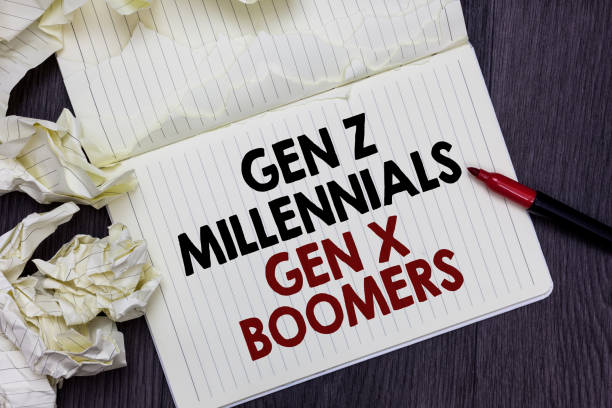
Defining the Generations: Who's Who in the Workplace?
To understand how Gen Z is redefining the workplace, it's essential to first contextualise the other generational players in the workforce and their respective attitudes towards work.
-
Baby Boomers (1946-1964): Born in the post-World War II era, Baby Boomers came of age during a period of economic prosperity. Their work ethic is characterised by loyalty to employers, long hours, and a belief that hard work and personal sacrifice lead to career success.
-
Gen X (1965-1980): Often called the "latchkey" generation, Gen X grew up in a time of economic turbulence. While they value independence and adaptability, many Gen Xers still subscribe to the traditional model of career advancement, often placing high value on hard work, though they also acknowledge the importance of balance.
-
Millennials (1981-1996): Millennials are digital pioneers shaped by the rise of the internet and the expansion of the gig economy. They tend to seek meaningful work but have been heavily influenced by hustle culture. For them, work-life balance is desirable, yet many feel trapped by the pressures of a competitive job market.
-
Gen Z (1997-2012): The newest workforce entrants are digital natives who have grown up with constant access to information. Gen Z prioritises flexibility, mental health, and work-life balance more than any previous generation. Their approach is shaped by the lessons learned from observing the sacrifices of their parents and older peers.
Sacrifice vs. Balance: A Generational Divide in Work Ethics
The generational shift in work ethics boils down to two opposing mindsets: sacrifice and balance.
For Baby Boomers and, to some extent, Gen X, the pathway to success has long been equated with relentless hard work. Baby Boomers, in particular, embody the "nose to the grindstone" mentality, often putting their careers ahead of personal life. This generation was willing to make significant sacrifices—long hours, missed family events, and postponed vacations—in the belief that success was earned through personal sacrifice.
Gen Z, on the other hand, seeks balance from the outset. This generation has grown up witnessing the toll that overworking can take on health, relationships, and mental well-being. For them, the idea that one must choose between career success and personal happiness is outdated. They’re motivated to pursue careers that offer flexibility, foster mental wellness, and allow space for life outside of work. The value they place on balance is a direct response to the burnout they’ve seen their parents and older colleagues endure.
For more like this,read: Narayan Murthy urges Indian youth to increase working hours, sparks debate
Why Work-Life Balance Matters to Gen Z
One of the most defining characteristics of Gen Z is their heightened awareness of mental health and well-being. Unlike previous generations, Gen Z has grown up in a world where mental health issues like stress, anxiety, and burnout are openly discussed. With social media constantly showcasing both the successes and struggles of their peers, they’ve been quick to recognise the dangers of overworking.
Gen Z has also witnessed the mistakes made by older generations, particularly Millennials, who became caught up in the "hustle culture." This hypercompetitive environment has led to widespread burnout, often at the expense of personal fulfilment. Gen Z aims to break this cycle. For them, work is important, but it should never come at the cost of personal well-being or mental health. They are more likely to seek employers that offer flexible hours, remote work options, and mental health support.
In fact, companies that don’t prioritise work-life balance risk losing top talent, as Gen Z is willing to walk away from jobs that demand too much at the expense of their personal lives.

Recent Trends in Work-Life Balance Preferences
Recent research provides compelling evidence of the growing importance of work-life balance across all generations, with a particular emphasis on younger workers. According to a study by Randstad, more than half (61%) of workers wouldn't accept a position that could negatively impact their work-life balance. This sentiment is especially strong among those under 45, while just over half of those 55 and older share this view (Randstad, 2023).
The COVID-19 pandemic has played a significant role in shaping these attitudes. In 2021, during the height of the pandemic, 67% of surveyed individuals reported feeling more empowered to make changes to their work-life balance. This shift aligns with the broader trend of younger workers seeking meaningful work and organisations whose values resonate with their own.
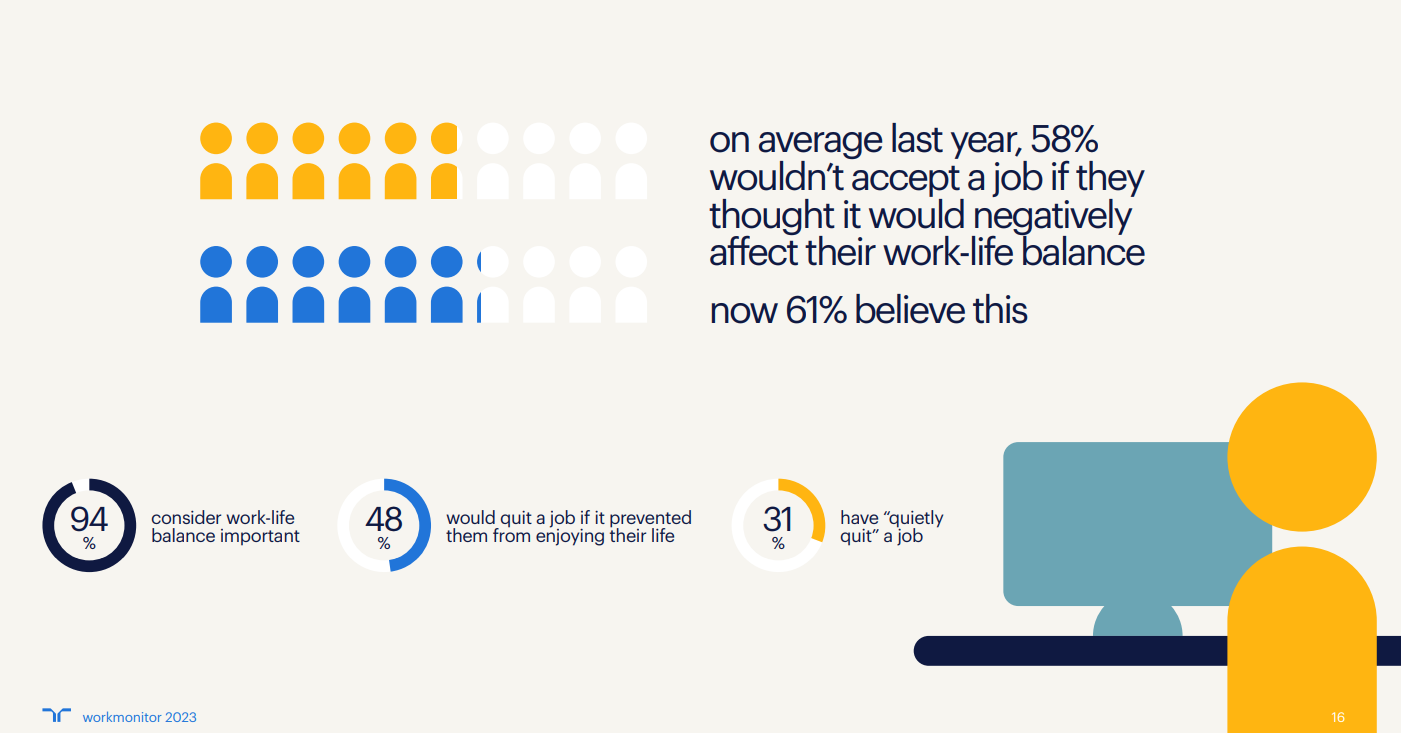
Interestingly, despite the generational differences in prioritising work-life balance, all age groups continue to view work as an important part of their lives. The study found only a five percentage point difference between the youngest (74%) and oldest (69%) workers in this regard.
The data also reveals that people increasingly desire jobs that accommodate their lifestyles, rather than the reverse. For those contemplating leaving their current employers, key drivers include:
- Better working conditions (34% cited leaving a toxic workplace)
- Lack of development opportunities (30%)
Nearly half (48%) of respondents stated they would resign if their job prevented them from enjoying life, with one-third having already done so due to poor work-life fit. Moreover, employee engagement is affected, with 31% admitting to having "quiet quit" – a phenomenon where workers perform only the minimum required in their roles due to dissatisfaction.
These findings underscore the growing importance of work-life balance across all generations, while highlighting the particularly strong stance taken by younger workers like Gen Z. As the workforce continues to evolve, employers will need to adapt to these changing priorities to attract and retain top talent.
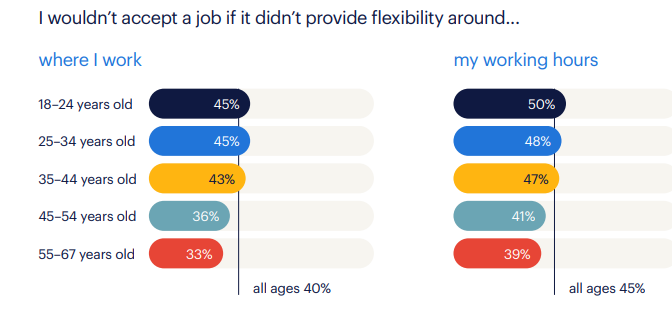
[Source: Randstad Workmonitor 2023 - https://workforceinsights.randstad.com/hubfs/Workmonitor/2023/Randstad_Workmonitor_2023.pdf?hsLang=nl]
Gender Perspectives: How Men and Women Differ on Work-Life Balance
The pursuit of work-life balance is not the same for everyone. Historically, gender roles have shaped how men and women experience the workplace, and this continues to influence their expectations for work-life balance.
-
Men’s Perspective: Traditionally, men have been expected to prioritise their careers, often at the expense of family life. However, this is slowly changing, especially among Gen Z men, who are more inclined to seek a balance between work and personal life. Many now desire flexibility in their jobs to spend more time with family or pursue personal interests.
-
Women’s Perspective: Women have long faced the challenge of balancing career and family responsibilities, often juggling both roles simultaneously. This pressure has been particularly intense for previous generations, who were encouraged to "have it all." Gen Z women, however, are challenging this narrative. They want thriving careers, but they also want the freedom to live their lives fully, without the guilt that previous generations felt for stepping back from work.

Work-Life Balance Across Generations: A Comparison
Each generation views work-life balance differently, often based on their unique experiences and the cultural norms of their time.
-
Baby Boomers: For Baby Boomers, the idea of balance is almost foreign. Their value system is rooted in the belief that career success requires sacrifice, often viewing Gen Z's approach as a threat to productivity and dedication.
-
Gen X: While Gen X sees the importance of work-life balance, they are often torn between the old and the new. Many in this generation still adhere to traditional values but are beginning to acknowledge the need for flexibility, particularly as they enter their later career stages.
-
Millennials: Caught in the middle, Millennials aspire to work-life balance but often find themselves succumbing to the pressures of hustle culture. They’re more likely to work long hours in hopes of proving their worth, though they are increasingly adopting healthier work habits as they age.
-
Gen Z: Gen Z stands apart in their unapologetic stance on prioritising balance. They reject the idea that one must "work until you drop" and are willing to challenge long-standing norms to create a healthier, more sustainable relationship with work.
For more trending topics like this, read: The Quiet Vacationing Trend: Millennials Taking Breaks without Bosses Knowing
Can Gen Z's Approach Lead to Greater Success?
The question of whether Gen Z is right to prioritise work-life balance is a hot topic of debate. Many from older generations feel that Gen Z’s approach is unrealistic, but there’s mounting evidence that work-life balance improves productivity, mental health, and overall job satisfaction.
A 2019 study found that organisations fostering work-life balance saw a 25% improvement in employee retention compared to those that didn’t. This demonstrates the tangible benefits of balance in preventing burnout and enhancing employee engagement. According to a study published by the National Center for Biotechnology Information (NCBI), work-life imbalance is associated with increased stress, mental health problems, and a higher risk of burnout, which directly impacts job performance and retention.
The traditional mindset that “sacrifice equals success” is being challenged, and perhaps it’s time for older generations to learn from Gen Z’s fresh perspective. Success doesn’t have to come at the expense of personal well-being. By fostering a healthier relationship between work and life, we might just see more creative, productive, and satisfied workers across all generations.
_1726305432.png)
Conclusion: Learning from the Past to Build a Balanced Future
The generational debate on work-life balance reflects the shifting values in today’s workplace. While Baby Boomers and Gen X may continue to prioritise hard work and sacrifice, Gen Z is leading the charge towards a more balanced, fulfilling professional life. This younger generation is showing us that success doesn’t require sacrificing health or personal happiness.
By learning from the mistakes of the past, Gen Z is paving the way for a future where mental health, personal fulfilment, and professional success are not mutually exclusive but can thrive in harmony. In this evolving landscape, perhaps it’s time for everyone to embrace a new definition of success—one that includes balance.
Inputs by Agencies
Image Source: Multiple Sources
Ⓒ Copyright 2024. All Rights Reserved Powered by Vygr Media.

